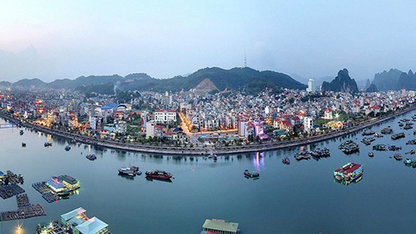Vietnam: Quang Ninh extends its dominant rank in Provincial Competitive Index
The Hanoitimes – Vietnam’s northern province of Quang Ninh dominates the Provincial Competitive Index (PCI) 2017 among 63 provinces and cities nationwide, gaining the top score of 70.7 points.
The Vietnam Chamber of Commerce and Industry (VCCI) and the United States Agency for International Development (USAID) released the PCI 2017 Annual Report on March 22 in Hanoi.
The Provincial Competitiveness Index (PCI) in Vietnam is designed to assess and rank the performance, capacity and willingness of provincial governments to develop business-friendly regulatory environments for private sector development.
The Provincial Competitiveness Index (PCI) in Vietnam is designed to assess and rank the performance, capacity and willingness of provincial governments to develop business-friendly regulatory environments for private sector development.
Quang Ninh first took the lead in the PCI 2017 rankings with 70.7 points. Leading to the rankings, Da Nang has dropped to No.2 with 70.1 points. PCI 2017 witnessed the strong rise of provinces and cities in the Mekong Delta region with four localities listed in the Top 10. Specifically, Dong Thap ranks 3rd in PCI 2017 with 68.8 points; Long An 66.7 points; Ben Tre 66.7 points; Vinh Long (66.1 points).
Being the leading economic city in the country, Ho Chi Minh City ranked only 8th with 65.2 points; Hanoi is only in 13th possition with 64.71 points.
Director General of the Legal Department of VCCI Dau Anh Tuan reported that this year, the survey received responses from 10,245 private enterprises in 63 provinces and cities (including 2,003 enterprises which were established in 2016 and 2017) and 1,765 FDI from 47 foreign countries and territories in 21 provinces and cities.
During recent years, with the active and creative implementation of three strategic breakthroughs, focusing on the comprehensive and basic reform of administrative procedures, Quang Ninh province has gained many positive results in business environment and the provincial competitiveness index (PCI).
Besides the PCI ranking, the 2017 version assesses Vietnam’s business environment under the eyes of foreign investors. They assess administrative reform, business advantages and disadvantages, and labor issues.
The PCI report put aside a chapter on business management quality. “The PCI program has consistently promoted the voices of the private sector while engaging provincial governments in business environment reforms,” said Vu Tien Loc, VCCI President.
“The national competitiveness is mainly determined by economic governance and the ease of doing business in cities and provinces,” said the VCCI president. “The proactivity of provincial leaders, and professionalism and effectiveness of local government officials are deciding the speed and direction of Vietnam development in the times to come,” Loc added.
Economic governance of provinces nationwide and cities continued to improve, with positive improvements seen in such areas such as business registration, access to information and administrative procedure reforms.
However, Loc expressed concern over the stagnation in the authorities’ efforts to create a level playing field for private sector competition. Small and medium-sized enterprises still struggle to get access to land, funds and regulatory information.
Macroeconomic and regulatory risks continued to be one of the most concerning risks among foreign invested firms when doing business in Vietnam.
Vietnam’s business environment is still hindered by informal costs, regulatory burdens, the quality of infrastructure, and public services such as healthcare and labor training.
To improve this situation, Vietnam would benefit most from educational improvements that enhance the capacity of its labor force and the technological sophistication of domestic enterprises.
Being the leading economic city in the country, Ho Chi Minh City ranked only 8th with 65.2 points; Hanoi is only in 13th possition with 64.71 points.
Director General of the Legal Department of VCCI Dau Anh Tuan reported that this year, the survey received responses from 10,245 private enterprises in 63 provinces and cities (including 2,003 enterprises which were established in 2016 and 2017) and 1,765 FDI from 47 foreign countries and territories in 21 provinces and cities.
During recent years, with the active and creative implementation of three strategic breakthroughs, focusing on the comprehensive and basic reform of administrative procedures, Quang Ninh province has gained many positive results in business environment and the provincial competitiveness index (PCI).
Besides the PCI ranking, the 2017 version assesses Vietnam’s business environment under the eyes of foreign investors. They assess administrative reform, business advantages and disadvantages, and labor issues.
The PCI report put aside a chapter on business management quality. “The PCI program has consistently promoted the voices of the private sector while engaging provincial governments in business environment reforms,” said Vu Tien Loc, VCCI President.
“The national competitiveness is mainly determined by economic governance and the ease of doing business in cities and provinces,” said the VCCI president. “The proactivity of provincial leaders, and professionalism and effectiveness of local government officials are deciding the speed and direction of Vietnam development in the times to come,” Loc added.
Economic governance of provinces nationwide and cities continued to improve, with positive improvements seen in such areas such as business registration, access to information and administrative procedure reforms.
However, Loc expressed concern over the stagnation in the authorities’ efforts to create a level playing field for private sector competition. Small and medium-sized enterprises still struggle to get access to land, funds and regulatory information.
Macroeconomic and regulatory risks continued to be one of the most concerning risks among foreign invested firms when doing business in Vietnam.
Vietnam’s business environment is still hindered by informal costs, regulatory burdens, the quality of infrastructure, and public services such as healthcare and labor training.
To improve this situation, Vietnam would benefit most from educational improvements that enhance the capacity of its labor force and the technological sophistication of domestic enterprises.
Source: http://www.hanoitimes.vn/economy/2018/03/81E0C38A/quang-ninh-extends-its-dominant-rank-in-provincial-competitive-index/


 Thailand
Thailand




